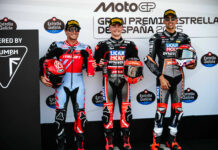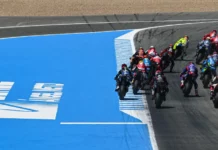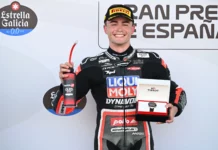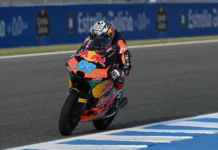MotoAmerica and Dunlop held a test May 17-18 at Pittsburgh International Race Complex (a.k.a. Pitt Race), near Pittsburgh, Pennsylvania, so riders and teams could become acclimated with the circuit prior to MotoAmerica holding an inaugural event there August 25-27.
During the test, most of the top riders identified one particular section of the track as being a major problem in need of an immediate solution in order to have a relatively safe event. That section is Turn 16, a sweeping right-hander that riders brake through to set up for slower Turn 17.
After the first session of the test, two-time and defending Superbike Champion Cameron Beaubier’s on-board video and data showed that he entered Turn 16 at 156 mph with 51 degrees of lean angle when he started applying the brakes mid-corner for Turn 17, and he did all of this while pointed at an Armco barrier that was too close to the track, according to several riders, including Beaubier.
Simply moving the Armco barrier back was not an option due to a steep downslope and a property line behind the Armco barrier. So several other ideas to make Turn 16 safer were talked about at the test.
Then on June 17, Superbike team owner/rider Kyle Wyman returned to Pitt Race — at the request of MotoAmerica — with a stock Yamaha YZF-R1, a fresh set of Dunlop race tires and a mission of considering some of the proposed solutions.
“The biggest thing in going out there was to see what was feasible,” Wyman told Roadracingworld.com Thursday at Utah Motorsports Campus. “You can look at a track map and drive around there and say let’s put this here and put that there, but when you start looking at where their water drainage happens and where the elevation is and there’s piping over here, it makes it a lot more challenging.
“I went to basically try as much as I possible could with track time all to myself so I could stop on the track and I could turn around and try things, stuff like that. We tried a layout that MotoAmerica had come up with. It was basically a chicane on the exit of Turn 16 that was meant to slow you down on the entrance to get through it, but it didn’t slow down the entry [much] and it made it a little bit scarier to me than it was.
“I tried a bunch of different slowdowns, chicanes, starts, stops to try to see where I needed the speed to be not just to make it safe but raceable and not rinky-dink and everything else.
“What we came up with was a right-left chicane about two-thirds of the way [between Turns 15 and 16], which doesn’t ruin the drive down the hill out of Turn 14. It’s going to have a lot of the same feel at Sonoma at the end of the esses when you have that right-left busstop chicane and then accelerate through a fast right. It’s going to have the same kind of feel as that, and the wall’s not close enough to be a factor.
“There’s really only one spot on that back straightaway where it’s feasible to do that with the way the hills are and everything. What they’re going to do is basically put down a big slab of pavement and use false curbing that we can adjust. So it’s not like they’re going to pave a track and if it works it works. We’re going to be able to put something down, run it, and if it doesn’t work we’ll be able to go back out there and move the curbing and figure out what works best.
“I wanted to make sure we did something that guys weren’t going to say I’d rather take the risk than ride through that bull—t go-kart chicane. You’re not going to please everybody, but hopefully it’s the best scenario. Josh Hayes and Toni Elias are on the same page with me and want to see what I drew up.”
The chicane that Wyman is proposing may have the added benefit of improving the racing on the track because the braking zone going into the new chicane will be a new passing zone late in the lap, right in front of the pit straightaway and fans.
The new chicane is still in the planning stage, however.
According to MotoAmerica COO Chuck Aksland, “We’re working together with the folks at Pitt Race to come up with a solution that works for everybody.”






